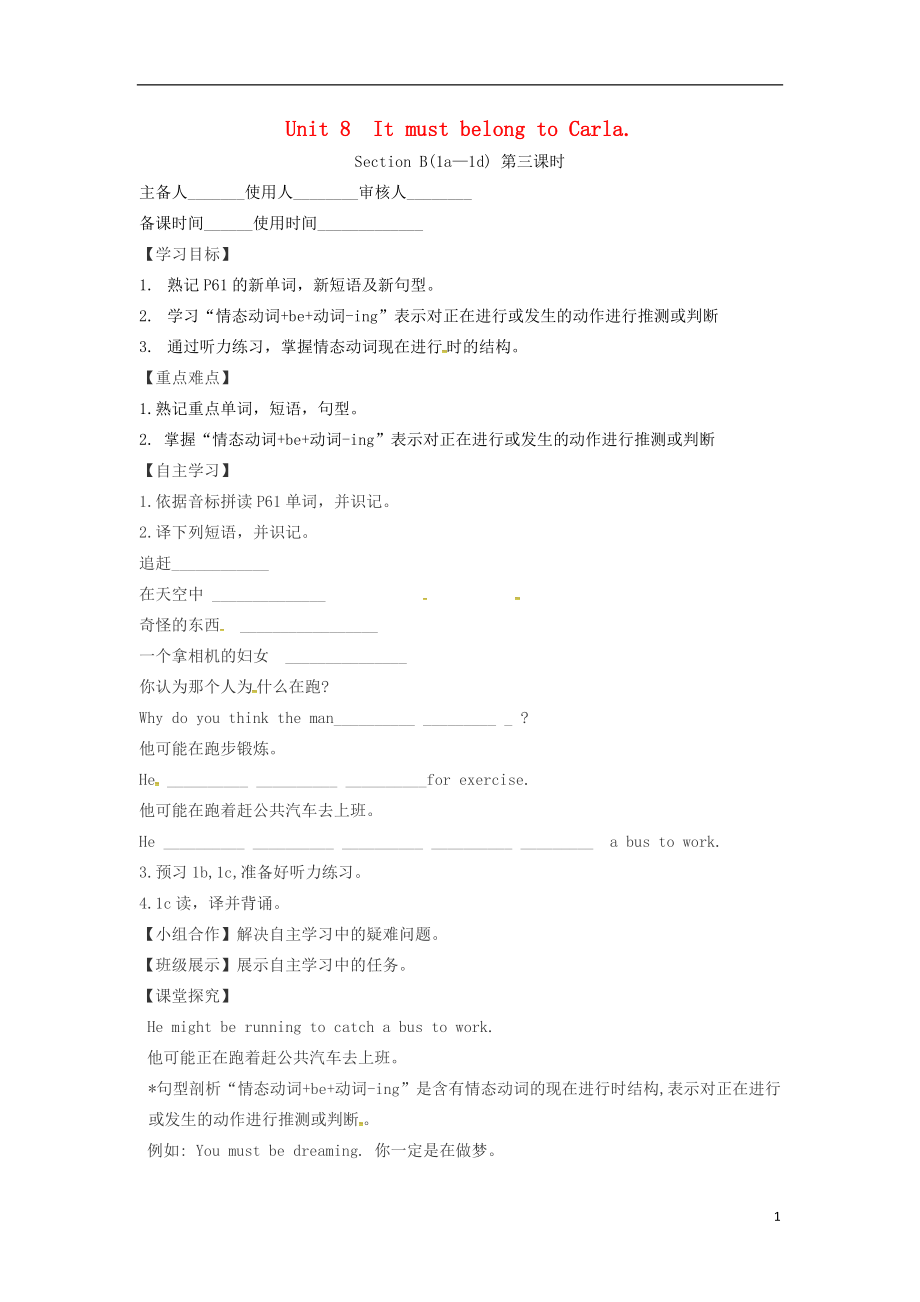《山西省運城市垣曲縣九年級英語全冊 Unit 8 It must belong to Carla(第3課時)Section B(1a-1d)學(xué)案(無答案)(新版)人教新目標(biāo)版》由會員分享�,可在線閱讀�,更多相關(guān)《山西省運城市垣曲縣九年級英語全冊 Unit 8 It must belong to Carla(第3課時)Section B(1a-1d)學(xué)案(無答案)(新版)人教新目標(biāo)版(2頁珍藏版)》請在裝配圖網(wǎng)上搜索。
1�、
Unit 8 It must belong to Carla.
Section B(1a—1d) 第三課時
主備人��_______使用人________審核人________
備課時間______使用時間_____________
【學(xué)習(xí)目標(biāo)】
1. 熟記P61的新單詞,新短語及新句型�。
2. 學(xué)習(xí)“情態(tài)動詞+be+動詞-ing”表示對正在進行或發(fā)生的動作進行推測或判斷
3. 通過聽力練習(xí),掌握情態(tài)動詞現(xiàn)在進行時的結(jié)構(gòu)�。
【重點難點】
1.熟記重點單詞,短語��,句型�。
2. 掌握“情態(tài)動詞+be+動詞-ing”表示對正在進行或發(fā)生的動作進行推測或判斷
【自主學(xué)習(xí)】
2、1. 依據(jù)音標(biāo)拼讀P61單詞��,并識記�。
2. 譯下列短語,并識記��。
追趕____________
在天空中 ______________
奇怪的東西 _________________
一個拿相機的婦女 _______________
你認為那個人為什么在跑?
Why do you think the man__________ _________ _ ?
他可能在跑步鍛煉�。
He __________ __________ _
3、_________for exercise.
他可能在跑著趕公共汽車去上班�。
He __________ __________ __________ __________ _________ a bus to work.
3. 預(yù)習(xí)1b,1c,準(zhǔn)備好聽力練習(xí)。
4. 1c讀�,譯并背誦。
【小組合作】解決自主學(xué)習(xí)中的疑難問題。
【班級展示】展示自主學(xué)習(xí)中的任務(wù)�。
【課堂探究】
He might be running to catch a bus to work.
他可能正在跑著趕公共汽車去上班。
*句型剖析“情態(tài)動詞+be+動詞-ing”是含有情態(tài)動詞的現(xiàn)在進行時結(jié)
4�、構(gòu), 表示對正在進行或發(fā)生的動作進行推測或判斷。
例如: You must be dreaming. 你一定是在做夢����。
—Where’s your father, Jim?
—He is in the living room. He__________ TV.
A. mustn’t watch B. might be watching
C. can’t watch D. must watch
【課堂總結(jié)】
【達標(biāo)練習(xí)】Ⅰ. 選擇方框內(nèi)的詞或詞組并用其適當(dāng)形式填空
(1). It was dangerous, but the
5、plane__________ safely.
(2). Look! The boy__________ a dog.
(3). Do you believe there are________ ?
(4). He wants to wear a__________ to attend their wedding.
(5). —Why is he running fast?
—__________ the train
2. The woman ______a camera is from the USA. She came to China for a trip.
A
6����、. have B. with C. on D. in
3. Every morning, my father goes running ______exercise.
A. with B. for C. at D. in
4. My brother likes to______jeans. In this way, he looks smart.
A. dress B. wear C. put on D. in
5. He ______ know the way to the museum because he is new here.
A. mustn’t B. may not C. can’t D. couldn’t
2
 山西省運城市垣曲縣九年級英語全冊 Unit 8 It must belong to Carla(第3課時)Section B(1a-1d)學(xué)案(無答案)(新版)人教新目標(biāo)版
山西省運城市垣曲縣九年級英語全冊 Unit 8 It must belong to Carla(第3課時)Section B(1a-1d)學(xué)案(無答案)(新版)人教新目標(biāo)版

